Award Ceremonies Honor Exemplary Community Engagement
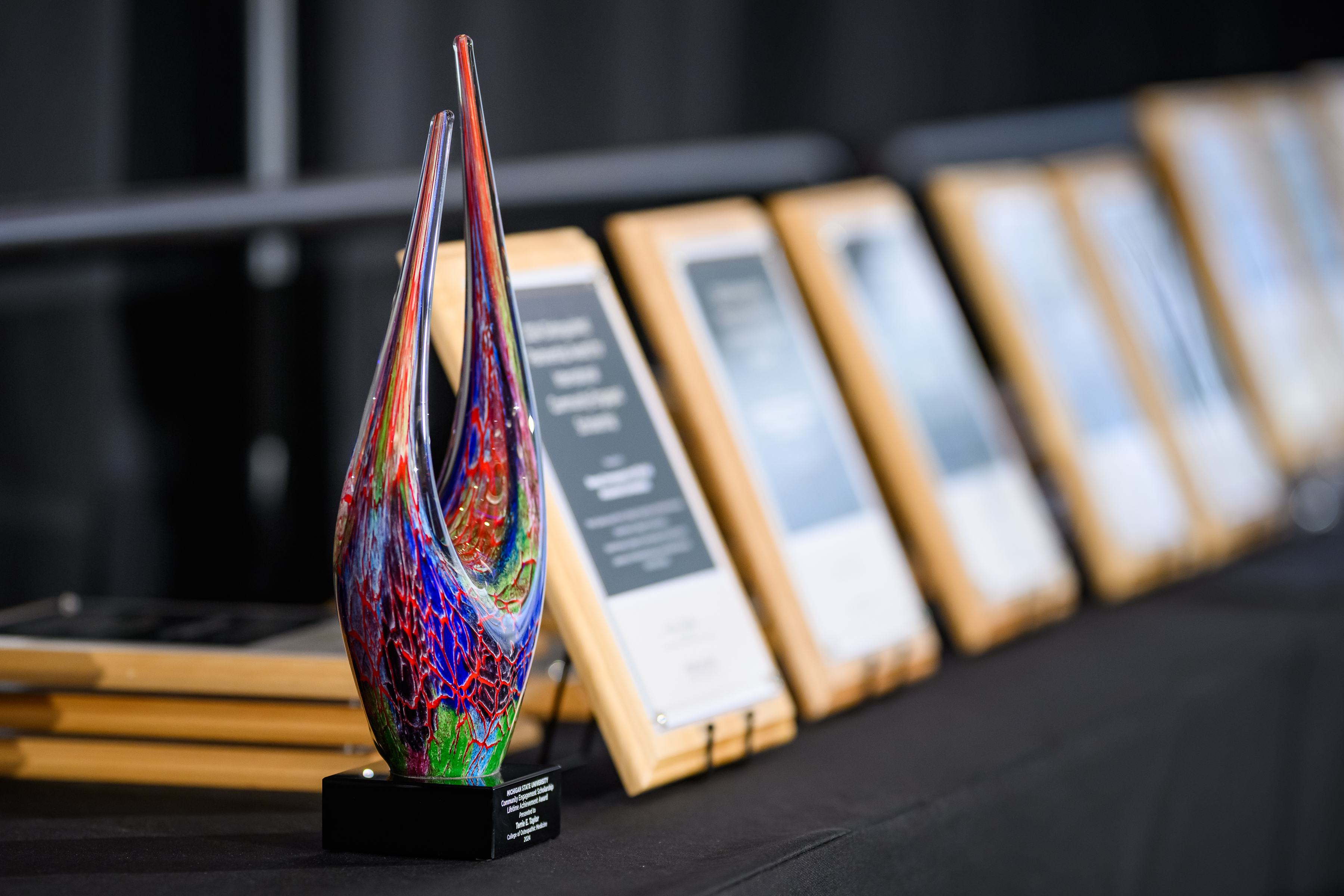
For more than 165 years, Michigan State University has been home to students, faculty, and staff who have dedicated their time, studies, and careers to addressing societal challenges at the local level and around the world.
At the All-University Awards ConvocationExternal link - opens in new window on May 1, MSU will honor these scholars. Of the 10 awards being presented, the Community Engagement Scholarship AwardExternal link - opens in new window (CESA) shines a light on the highly engaged community-based scholarship collaborations that positively impact both community and scholarship.
This year the CESA will be bestowed upon Courtney Carignan, an assistant professor in the College of Agriculture and Natural Resources and the College of Veterinary Medicine, and her partner, Great Lakes PFAS Network. Carignan engaged with communities affected by PFAS contamination to share information, connections, and resources, supporting the empowerment and autonomy of community partners.
Carignan was among several faculty, staff, and students recognized at the annual Outreach and Engagement Awards CeremonyExternal link - opens in new window in March for their collaborative work with communities.
By connecting university knowledge with partner/community knowledge, this year’s award winners have actively demonstrated MSU’s unwavering commitment to collaborative, participatory, and transformative work.
“The efforts of university representatives and their community partners is a true testament to the vast impacts that can be made when we work together,” said Kwesi Brookins, vice provost for University Outreach and Engagement. “The award winners we recognized this year are all great examples of the importance of university-community partnerships.”
Recipients of the 2024 awards include:
Michigan State University Community Engagement Scholarship Lifetime Achievement Award
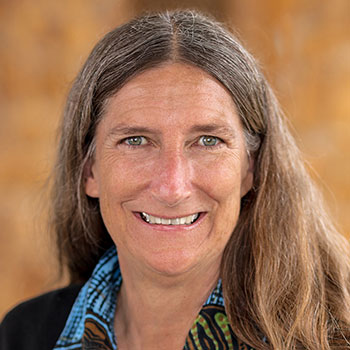
Terrie E. Taylor
Recognition of outstanding and sustained accomplishment in community-engaged scholarship through research, creative activity, teaching, and/or service. Given the special nature of this distinction, it is not an annual award, but is conferred on those occasions in which the individual’s extraordinary accomplishments are sustained over the span of a career.
Terrie E. Taylor, College of Osteopathic Medicine
Dr. Terrie E. Taylor is an internationally recognized scientist and physician who has devoted her career to the fight against malaria, which she calls the “Voldemort of parasites.” For nearly 40 years, she has worked tirelessly to save the lives of children in Africa afflicted with the deadliest form of the disease. She spends six months of the year in Malawi conducting malaria research while also treating patients, the vast majority of whom are children. Since joining the faculty of the MSU College of Osteopathic Medicine, Taylor has collaborated with international communities in her scholarly, clinical, and outreach efforts. She has co-authored more than 200 peer-reviewed articles and has received nearly $35 million in grants, many of which included researchers trained by her in the communities where she is engaged. A passionate and dedicated educator, Taylor has hosted 24 students per year for six-week rotations at Queen Elizabeth Hospital in Blantyre, Malawi, teaching them in groups of eight at a time. The Blantyre Malaria Project, established by Taylor and colleagues, conducts research and patient care in the field of pediatric cerebral malaria.
Distinguished Partnership Award for Community-Engaged Research
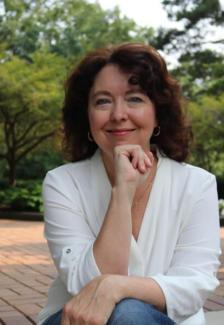
Holly Brophy-Herb
Recognition of a university-community partnership for significant, contextually responsive, scholarly, and impactful collaboration in inquiry and the discovery of new knowledge and/or the development of new insights.
Supporting Educators’ Well-Being and Relationship-Based Practices in Early Childhood Programs
Holly E. Brophy-Herb, College of Social Science
Head Start for Kent County
High-quality early care and education for very young children offer the largest, longest impacts on children’s development, compared to programs beginning later. However, early childhood teacher stress/burnout, occurring at higher rates than among teachers of older children, poses significant risks to their capacity to engage in high-quality educational practices. Similarly, early childhood home visitors support a diverse population of children and families, including those whose development is at greater risk due to complex, poverty-related stressors. Over the past 26 years, the sustained, productive relationship between Holly Brophy-Herb and Early Head Start (EHS)/Head Start (HS), a federally funded program serving children 0-5 and their families experiencing low income, has addressed these critical issues. Their shared goals are to develop, implement, and evaluate materials to support children’s social-emotional development, health, and well-being via promoting caregiver (parents, teachers, home visitors) well-being and high-quality practices. This partnership has yielded the development of widely adopted curricula, almost 20 publications, and more than $2.9 million in funding. Longitudinal work on stress with more than 100 early childhood teachers provided significant insight into coping and is informing next steps in the team’s work.
Distinguished Partnership Award for Community-Engaged Creative Activity
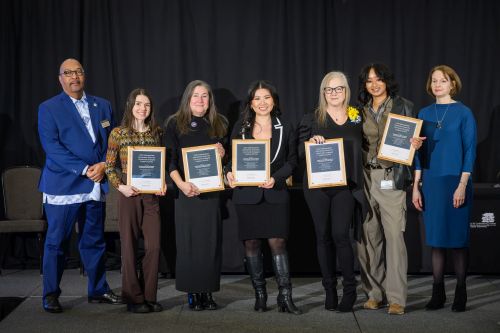
From left: Kwesi Brookins, Sarah Hopkins, Lansing Art Gallery and Education Center; Nina Silbergleit, REACH Art Studios; Samantha Le, Capital City Film Festival; Nancy DeJoy; Fatima Konare, MSU; and Judith Stoddard, vice provost for University Arts and Collections
Recognition of a university-community partnership for significant, contextually responsive, scholarly, and impactful collaboration in the creation of new artistic or literary performances and expressions.
Creativity in the Time of COVID-19: Art for Equity and Social Justice
Nancy DeJoy, College of Arts and Letters
Capital City Film Festival
Impression 5 Science Center
Lansing Art Gallery and Education Center
REACH Studio Art Center
Refugee Development Center
Nancy DeJoy’s community-university partnerships at MSU span 15 years. Focused on social justice issues related to identity, DeJoy has worked with survivors of sexual violence and several community partners. These partnerships have resulted in art exhibits/installations and conference presentations, expanding the public spaces for voices of people often not heard in the stories we tell about who we are as a community. Her most recent collaboration, “Creativity in the Time of COVID-19: Art for Equity and Social Justice,” makes space for the creative work of those disproportionately affected by the pandemic. DeJoy and her partners collaborated to write a grant for the project. Funded by the Mellon Foundation, the exhibit included over 200 pieces of art from seven continents. Satellites to the main exhibits were installed at the Refugee Development Center, REACH Studio Art Center, Lansing Art Gallery and Education Center, and Impression 5, ensuring that a diverse range of people could view and respond to the stories told by exhibit materials. MSU Libraries will house a repository of the exhibits, making them available to people around the world and adding to the story of the pandemic the voices and creative work of many who often go unheard.
Distinguished Partnership Award for Community-Engaged Teaching
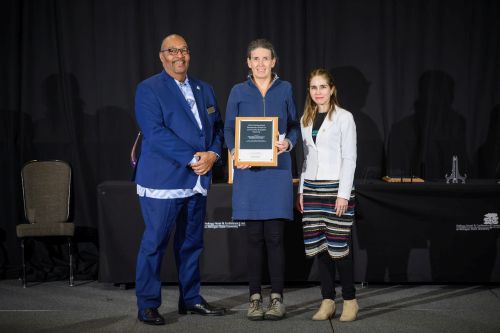
From left: Kwesi Brookins, Donna L. Harris, and Carolina Restini, associate professor, College of Osteopathic Medicine
Recognition of a university-community partnership for significant, contextually responsive, scholarly, and impactful collaboration in sharing knowledge with learners through either formal or informal arrangements, whether credit-bearing, noncredit, guided by a teacher, or self-directed.
Making Better Veterinarians and Providing Services for Pets
Donna L. Harris, College of Veterinary Medicine
Community Spay/Neuter Initiative Partnership (CSNIP)
MSU College of Veterinary Medicine (CVM) and CSNIP, a spay and neuter clinic in Grand Rapids, have collaborated since the first student requested to participate in an externship there in 2009. This collaboration has expanded and developed into a partnership in which fourth-year veterinary students hone their skills while serving CSNIP clients. For MSU CVM students, the CSNIP externship is one of the most sought-after experiences. Three students are accepted for each three-week block and rotate through surgical practice, anesthetic induction, and working at the Well Pet Clinic. Because of CSNIP’s high caseload, students have the opportunity to advance their surgical and clinical skills at a rapid pace. In addition, students are exposed to clients from diverse backgrounds who have many challenges when accessing traditional veterinary care. CSNIP collaborates with CVM faculty when needed on complex cases, conducts research, and has seen a rise in patient care standards. CSNIP staff members enjoy the challenge of teaching veterinary students and the energy they bring to the practice. Another important benefit of this partnership is that it has developed a cohort of veterinarians who value the role nonprofits play in providing veterinary care for a community.
Distinguished Partnership Award for Community-Engaged Service
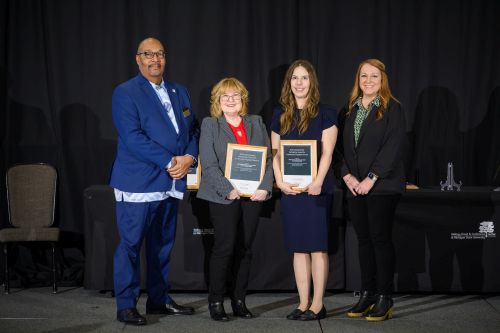
From left: Kwesi Brookins, Sandy Wynn-Stelt of the Great Lakes PFAS Action Network, Courtney Carignan, and Deanna East, associate director, MSU Extension
Recognition of a university-community partnership for significant, contextually responsive, scholarly, and impactful collaboration in the utilization of scholarly expertise to directly address specific issues identified by individuals, organizations, industries, or communities.
PFAS Research, Education, and Action for Community Health
Courtney Carignan, College of Agriculture and Natural Resources and College of Veterinary Medicine
Great Lakes PFAS Network
Per- and polyfluoroalkyl substances (PFASs) were first discovered in 2010 at the former Wurtsmith Air Force Base in Oscoda, a Michigan town on the coast of Lake Huron. Since then, many other PFAS-impacted sites have been identified in Michigan and across the globe. Detection of substantial contamination in drinking water can be an enormous source of stress for communities, which can be addressed by helping to improve understanding and promote health protective action. Courtney Carignan’s engagement with communities aims to provide service by sharing information, useful connections, and resources. Her research helps identify and address major gaps in knowledge or resources that are of high concern to the community. PFAS contamination was discovered in Rockford and Belmont (Kent County) in 2017 in connection with poor disposal practices by a local tannery. Spurred by the need for educational support voiced by the affected community and others, Carignan helped develop fact sheets on PFAS blood testing and medical screening as part of PFAS REACH, an NIH-funded project.
Distinguished Partnership Award for International Community-Engaged Scholarship
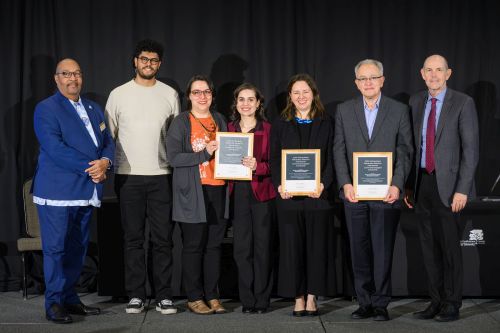
From left: Kwesi Brookins, Rafael Cavalcanti Lembi, Gisele Souza Neuls, Rachel Mourão, Maria Claudia Lopez Perez, Emilio Moran, and Steven Hanson, vice provost and dean for International Studies and Programs
Recognition of a university-community partnership for significant, contextually responsive, scholarly, and impactful collaboration—through research, creative activity, teaching, and/or service—undertaken outside the United States.
Energy Convergence for Off-Grid Amazonian Communities
Maria Claudia Lopez Perez, College of Agriculture and Natural Resources
Emilio Moran, College of Social Science
Rachel Mourão, College of Communication Arts and Sciences
Laboratory of Renewable Energy, Universidade Federal do Oeste Pará, Brazil
Approximately 650 million people worldwide lack consistent and affordable access to energy. Many of them reside in areas not covered by their country’s national grid, and, as a result, they rely on expensive and unreliable diesel generators. An interdisciplinary team of researchers from MSU and Brazil are collaborating with four off-grid communities in Santarém, Brazilian Amazon, to address this issue. Before this project, these communities had access to electricity for at most two to three hours per day, provided they could afford diesel fuel for a community generator. This lack of reliable electricity prevented them from having basic appliances, such as refrigerators, water pumps, and internet modems. Grounded in the scholarship of energy justice, energy sovereignty, and participatory co-design, researchers are working closely with communities through steps that include dimensioning, planning, installation, training, and managing an improved off-grid energy system. Researchers fostered community engagement through citizen science, participatory workshops, surveys, observations, and interactions with community members. Additionally, they provided training on technical installation and maintenance. Each community now owns and governs a system co-designed to align with its values, needs, and local ecological characteristics. They are no longer in the dark.
Graduate Student Awards for Community Engagement Scholarship
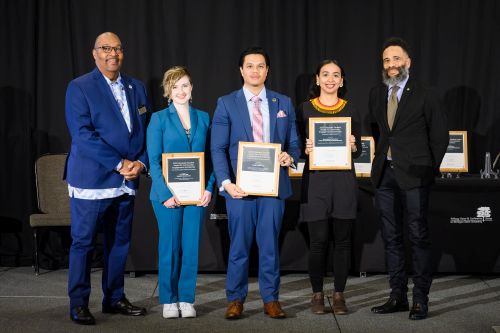
From left: Kwesi Brookins, Taylor Elyse Mills, Farish Jazlan, Maria Alejandra Garcia, and Pero G. Dagbovie, vice provost for Graduate and Postdoctoral Studies
Jointly sponsored by the MSU Graduate School, each year Michigan State invites nominations for this award, which is conferred in recognition of exemplary community-engaged work by a graduate or graduate professional student. This year, three students were recognized for their projects:
Farish Jazlan, College of Engineering
Evaluation of Ferry Services on Beaver, Sugar, Neebish, and Drummond Islands and Determining State Transportation Responsibilities to Island Residents
Taylor Elyse Mills, College of Arts and Letters
Anishinaabeg Law: An Introduction to Tribal Law for Michigan Legal Practitioners
Maria Alejandra Garcia, College of Agriculture and Natural Resources
Transforming Gender Norms in Rural Development: A Case in Colombia
Graduate Student Award for Science Communication and Outreach
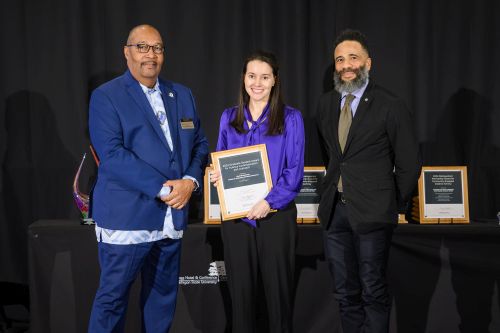
From left: Kwesi Brookins, Sheril Kirshenbaum, and Pero G. Dagbovie
For a second year, jointly sponsored by the MSU Graduate School, Michigan State invited nominations for this award, which is conferred in recognition of the exemplary translation and communication of scholarly ideas, research findings, and advancements in all academic disciplines to the public by a graduate or graduate professional student. This year, the award was conferred upon:
Sheril Kirshenbaum, College of Agriculture and Natural Resources
Serving Up Science
Spartan Volunteer Service Awards
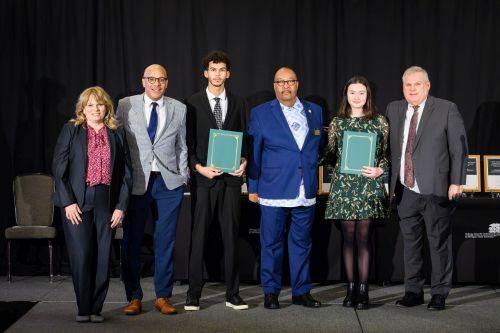
From left: Renee Brown, K. C. Keyton, Hady Omar, Kwesi Brookins, Marissa Malleck, and Allyn Shaw, assistant vice president for Student Development and Leadership and Dean of Students
The awards ceremony celebrated students who received Student Volunteer Service Awards from the Center for Community Engaged Learning, a department within UOE. These awards were bestowed on individuals who volunteered 100 or more hours over the course of one year. For 2022–23, 130 students received an award, and at the MSU Outreach and Engagement Awards Ceremony. They were represented by three students who each completed more than 750 hours of volunteer work:
Marissa Malleck, Lyman Briggs College and Honors College
Hady Omar, College of Natural Science
Arianna Pittenger, College of Social Science
- Written by Emily Springer, University Outreach and Engagement
- Photographs courtesy of Dane Robison with TimeFrame Photography, MSU College of Agriculture and Natural Resources, and MSU Honored Faculty